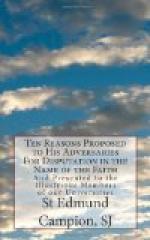On the whole then we must say that, if Campion did not come off gloriously, he at least acquitted himself well and honourably, and distinctly gained by the conflict. Offers of disputation were not the ideal way of forwarding a mission such as his. Nevertheless, in his case, despite circumstances the most adverse, the result had proved advantageous. It had greatly strengthened and encouraged his own followers, and that was in reality the best that could then be expected. Incidentally too the adverse rumours, which had gained ground during his seclusion, were dissipated. It was clear that, though he might have been deceived, his constancy was unconquerable.
Thus Campion’s Challenge and his Ten Reasons not only contain the message of his mission enunciated with characteristic eloquence, but the delivery of each message is an history-making event, big with dramatic consequences. The controversy about his book did not die with him, but continued for some years, until it was merged into the standing controversy between the two religions. We cannot describe it here.
Suffice it to say that Mr. Simpson, in the Appendix to his Edmund Campion enumerates not less than twenty works, which appeared in those controversies between 1581 and 1585. The chief defender of Father Campion’s writings was Father Robert Drury, S.J., but all his biographers also have something to say on the subject. The chief opponents are William Charke, Meredith Hanmer, William Fulke, Laurence Humphrey, William Whitaker, R. Stoke, John Field, Alexander Nowell, and William Day. Some further information on the whole subject may be found in articles by the late Father Morris and myself in The Month for July 1889, January 1905, and January 1910. [J.H.P.]
[Footnote 1: Of these four are in English translations, dated 1606 (by Richard Stock), 1632, 1687, and 1827. The present translation is thus the fifth into Campion’s mother tongue. Though each of the quaint old versions has its merits, and some do not lack charm, not one would adequately represent Campion to the modern reader. A new translation was a necessity—may I not say, a most happy one—seeing that Father Joseph Rickaby was at hand to satisfy it. [J.H.P.]]
[Footnote 2: The meaning is—“The ministers tyrannize over us, as if we were a kingdom of unlearned schoolboys, listening to a teacher of grammar.”]
[Footnote 3: Catholic Record Society IV., 14-17.]
[Footnote 4: Father Bombino calls him Richard Morris, and says he went into exile and lived with Allen first at Rheims, and afterwards at Rome, where he died in the English College. (Vita Campiani, p. 139)]
[Footnote 5: Father Morris identified the lady who let or lent Stonor Park, with Dame Cecilia Stonor, daughter of Leonard Chamberlain. Father Persons describes her as a widow, and if so, the Sir Francis, then alive, was not her husband, but her son. Both father and son had the same Christian name.]




